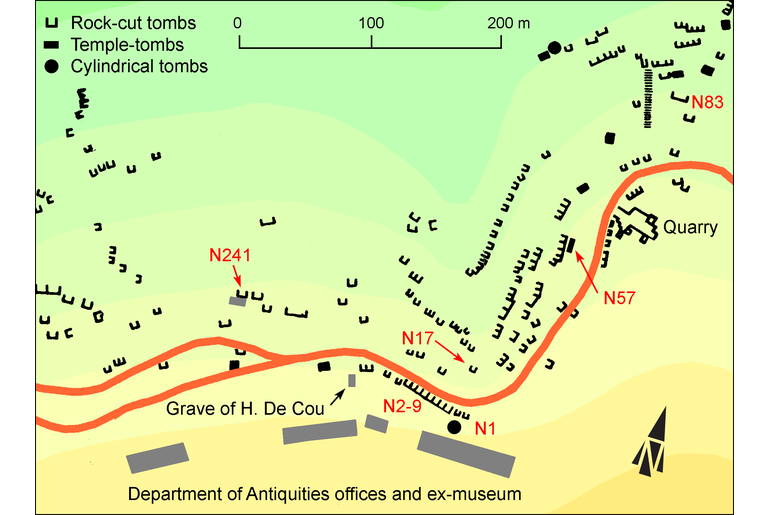Epitaph of Dionysis
GVCyr013
Trismegistos ID: 105905
Source Description
Support
White marble tapering stele, with a moulding above on three sides (0.41; 0.96;0.29).
Layout
Inscribed on front face under the moulding (0.365-0.39; 0.86;0.25-0.275), in 10 lines grouped by pairs.
Letters
0.025; triangular letters with projecting right stroke, lunate epsilon and sigma, slanting mu, sometimes smaller omicron, 'upside-down M'-shaped omega
Place of Origin
Findspot.
Date
Perhaps third century A.D.
Findspot
Found in November 1910 by the Norton mission at Cyrene pleiades; HGL : in the North Necropolis , in the area East of tomb N270 Cassels.
Last recorded Location
Seen by C. Dobias-Lalou in 1982 and again 2004 in Shahat : in a row displayed on the Terrace of the Office of the Department of Antiquities .
Text constituted from
Transcription from stone (CDL).
Bibliography
Robinson, 1913 Robinson, D.M., 1913, Inscriptions from the Cyrenaica, American Journal of Archaeology (AJA)17, 157-200 - see in bibliography , n. 35 and fig. 25, also p. 504; Peek, 1955 Peek, W., 1955, Griechische Vers-Inschriften, I-II, Berlin - see in bibliography , n. 1102. Cf. Santucci-Uhlenbrock, 2013 Santucci, A., Uhlenbrock, J., 2013, Cyrene Papers: the Final Report. Richard Norton's Exploration of the Northern Necropolis of Cyrene (24 October 1910 - 4 May 1911): From Archives to Archaeological Contexts, Libyan Studies, 44, 9-55 - see in bibliography , pp. 11-13 (area of discovery); Dobias-Lalou, 2014 Dobias-Lalou, C., 2014, Des pierres qui parlent en vers. A propos des épigrammes grecques de Cyrénaïque, in A. Delattre, A. Lionetto, La Muse de l'éphémère. Formes de la poésie de circonstance de l'Antiquité à la Renaissance, Paris, 319-331 - see in bibliography , pp. 327-328
Text
| Οὔνομα μὲν Διονύσις | ἔφυ δὲ πατρὶς Κυράνα | (vac. 1 line)
| καὶ παῖδ⸢α⸣ lapis: ες γενόμαν καὶ | παιδῶν παῖδας ἐσεῖδον | (vac. 1 line) | (5) καὶ βιοτᾶς λαχόμαν πλὴν | δύ' ἐτῶν ἑκατόν·
| θνήσκω δ' οὐ νούσοισι | δαμεὶς, εὕδων δ' ἐνὶ κοίτῃ· | (vac. 1 line) | τοῦτον ἔχω μισθὸν λύ|(10)σθιον εὐσεβίης.
Apparatus
9-10 λύ|σθιον : Robinson, 1913 Robinson, D.M., 1913, Inscriptions from the Cyrenaica, American Journal of Archaeology (AJA)17, 157-200 - see in bibliography δ̣ύ|σθιον : Robinson, 1913 Robinson, D.M., 1913, Inscriptions from the Cyrenaica, American Journal of Archaeology (AJA)17, 157-200 - see in bibliography ⸢λ⸣ lapis: δύ|σθιον (von Gaertringen's suggestion per epistulam, corrigenda p. 504)
French translation
Dionysis est mon nom et Cyrène, ma patrie ;
j'ai engendré des fils et connu les fils de mes fils
et le sort m'a donné une vie où deux ans manquaient pour faire cent.
Je meurs non parce que la maladie m'a dompté, mais en plein sommeil dans mon lit;
je trouve là l'ultime contrepartie de ma piété.
(trad. C. Dobias-Lalou at Dobias-Lalou, 2014 Dobias-Lalou, C., 2014, Des pierres qui parlent en vers. A propos des épigrammes grecques de Cyrénaïque, in A. Delattre, A. Lionetto, La Muse de l'éphémère. Formes de la poésie de circonstance de l'Antiquité à la Renaissance, Paris, 319-331 - see in bibliography , légèrement modifiée)English translation
My name is Dionysis, my homeland Cyrene;
I fathered sons and saw the sons of my sons;
the fate granted me with a life of hundred years but two.
I do not die subdued by any illness, but while sleeping in my bed,
getting thus the last reward of my piety.
Italian translation
Il mio nome è Dionysis, la mia patria Cirene;
ho generato figli e visto i figli dei miei figli;
la sorte mi ha concesso una vita di cento anni meno due.
Muoio non vittima di una malattia, ma mentre dormo nel mio letto.
Questo è il premio ultimo per la mia pietà.
Commentary
At line 1, the personal name Διονύσιος has its ending reduced to -ις, a fact which is well attested from first century A.D. onwards.
At line 3, παῖδες is plausibly a mistake. However some confusions do happen elsewhere between nominative and accusative plural.
At line 3, γενόμαν is used for the transitive verb ἐγεινάμην, a choice that might be explained by the metrical requirement; as for Peek, he suggests that the intended verb was τεκόμαν.
At lines 9-10, λύσθιον has υ for οι, a well attested change for the Imperial period.
Metrical analysis: one dactylic hexameter and two elegiac couplets.
Creative Commons Attributions-NonCommercial 4.0 International License.
All citation, reuse or distribution of this work must contain a link back to DOI: http://doi.org/10.6092/UNIBO/IGCYRGVCYR and the filename (IGCyr000000 or GVCyr000), as well as the year of consultation.
